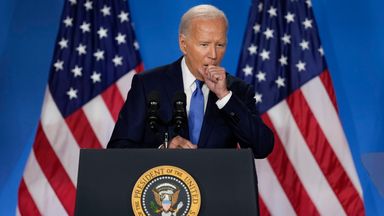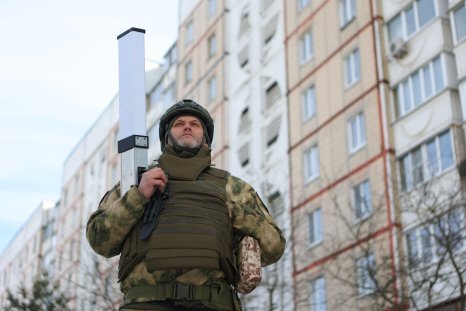North Korean workers are dismantling a railroad near the country's western border with the South, in another physical demonstration of ongoing hostilities between the neighboring nations.
South Korea's Defense Ministry said on Thursday that its forces had detected signs since late June that rails and ties were being removed on the Gyeongui line between the Military Demarcation Line and the North's nearby city of Kaesong, according to the Yonhap News Agency. Crossties, or sleepers, are rectangular supports that keep train tracks upright and correctly spaced, without which railroads cannot safely operate.
This was the latest in a series of moves by North Korea to disconnect and fortify the inter-Korean border and its surrounding Demilitarized Zone (DMZ).
Both the Gyeongui line in the west and the Donghae line in the east were earmarked for restoration as part of a 2018 agreement between North Korean leader Kim Jong Un and Moon Jae-in, his former South Korean counterpart.
Their plan for greater integration on the Korean Peninsula ultimately fell victim to the collapse of fragile peace talks in 2019 between Kim and former President Donald Trump. As a result, the two land links have remained largely unused for nearly two decades.
In January, Kim declared Seoul his regime's "principal enemy" and gave orders to sever all ties, physical and symbolic. South Korea's top spy agency said last month that the North's troops were demolishing parts of the Donghae line on the peninsula's east coast.
In the weeks before that, North Korean troops were spotted dismantling streetlights and installing mines in the DMZ, work that has led to inadvertent explosions and deaths, according to the South's military.
Kim, 40, fears that any connection to the liberal democracy in the south could undermine his regime's narrative at home, observers say.
As Seoul leans into its decades-old Mutual Defense Treaty with Washington to address the nuclear and missile threat to the north, Pyongyang is allying with the Kremlin—a relationship that has sparked concerns at NATO headquarters in Brussels.
Alliance leaders who gathered in Washington this week for NATO's annual summit formally accused the Democratic People's Republic of Korea (DPRK), North Korea's official name, of "fuelling Russia's war" in Ukraine through "direct military support."
"We strongly condemn the DPRK's exports of artillery shells and ballistic missiles, which are in violation of numerous United Nations Security Council resolutions, and note with great concern the deepening ties between the DPRK and Russia," the leaders said in a joint statement.
North Korea and Russia have repeatedly denied trading arms with each other. Neither government responded to Newsweek's multiple emailed requests for comment this week.
Disclaimer: The copyright of this article belongs to the original author. Reposting this article is solely for the purpose of information dissemination and does not constitute any investment advice. If there is any infringement, please contact us immediately. We will make corrections or deletions as necessary. Thank you.



